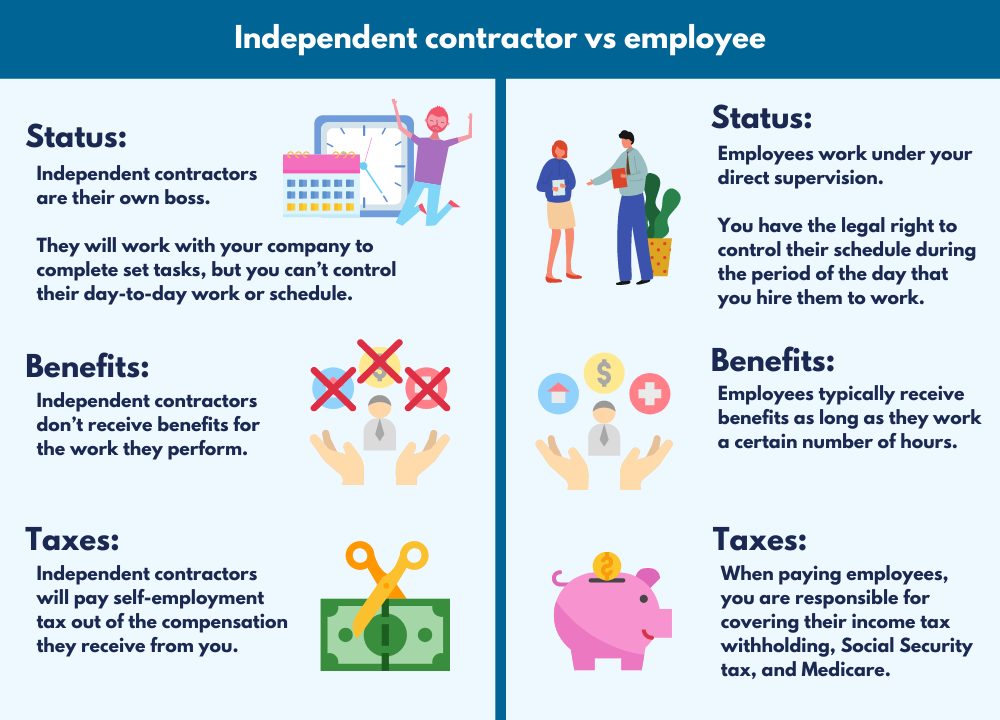The pros and cons of hiring independent contractors
When filling a role in your company, there are many decisions to make. Not only do you want to find the right candidate to complete the job, but you want to ensure that you hire them under the best category to fit your business needs.
Choosing to hire an independent contractor or an employee is a significant decision since today more, and more companies choose to bring on independent contractors – and for a good reason.
There are pros and cons to this decision.
Let’s explore them below.
What is an independent contractor
Independent contractors are self-employed workers.
When hiring them, you have the right to control and direct the result of their work, but no legal rights to demand what will be done or how it will be done.
You won’t serve the role of their boss – even if you hire them for ongoing work for your company.
Also, compensation paid to independent contractors is subject to self-employment tax. This is unlike hiring an employee in which you are responsible for covering various costs, including income tax withholding and FICA (Social Security tax and Medicare).
Independent contractor vs employee
While an independent contractor and employee can complete the same duties, there are key differences between the two that you want to consider when making your decision.

Pros of hiring independent contractors
Here are some of the many advantages associated with hiring independent contractors.
You might save money
While you might pay your independent contractors more per hour or per project, you will likely save in the end since you don’t have to pay employer-provided benefits, have office space available, provide equipment, and the like.
The benefits paid to employees can increase your payroll costs by 30% or more.
You face fewer legal problems
Usually, you will reduce your risk of running into legal troubles when working with independent contractors. This is because employees are protected by numerous state and federal laws, while independent contractors don’t offer the same protections. Some include:
- The right to minimum wage or time and a half for overtime.
- The right to work in a discrimination-free environment based on color, religion, gender, national origin, and the like.
- The right to take time off after the birth or adoption of a child.
You have flexibility when hiring
Unlike hiring an employee, independent contractors give you flexibility with your hiring needs. You can choose to bring on a contractor for a short term project then end your work agreement. They can work on and off throughout the year based on your needs, or maintain a consistent workload.
Also, most independent contractors will bring their set of personalized expertise to the table, so you will spend less time and money, offering extensive training to ensure the assigned duties are done correctly.
Contractors might be more motivated to perform
Independent contractors can cherry-pick the companies they work for and the tasks they complete. Therefore, you might find that they are more productive, and many will produce better quality work because they choose to complete all of the tasks they take on. Also, the flexible work schedule is a plus that can motivate the most talented employees to become contractors.
Cons of hiring independent contractors
Here are some of the disadvantages of hiring independent contractors.
Inconsistent staffing
Since you tend to hire independent contractors on a short term basis, there may be more inconsistent staffing within your company. That can be inconvenient, and you might find that the quality of work provided by contractors can vary significantly from superb to lacking in all areas.
You might prefer to have consistent staff who will produce a consistent result over time.
You must abide by the contract
When you begin working with an independent contractor, you both sign a contract related to the work to be performed. You can only terminate the independent contractor agreement if you do so within the terms of the contract. If you end an agreement without abiding by the contract, you could be in breach of contract and subject to legal proceedings.
More government oversight
The government is more comfortable with employees over independent contractors for financial reasons. Therefore, you might find that the government is more likely to audit your business if you have independent contractors. Audits could come federal, state or local levels including the IRS, the National Labor Relations Board, Occupational Safety and Health Administration (OSHA), unemployment compensation agency, or others.
No incentives
Contractors are hired to complete a task. There’s no real motivation to do extra on the job. They don’t receive benefits, there’s no opportunity for a promotion, they’re not always treated as part of the team, and they don’t look at you as their boss, therefore, they will oftentimes complete the task they’re paid for without doing the extra that employees might be motivated to do.
Compare the pros and cons of hiring an independent contractor
When you make the decision to hire an independent contractor, you want to consider your company’s overall needs.
How will a contractor vs. an employee help get the job done?
Which will lead to the best short term results and offer the best long term benefits for the company?





